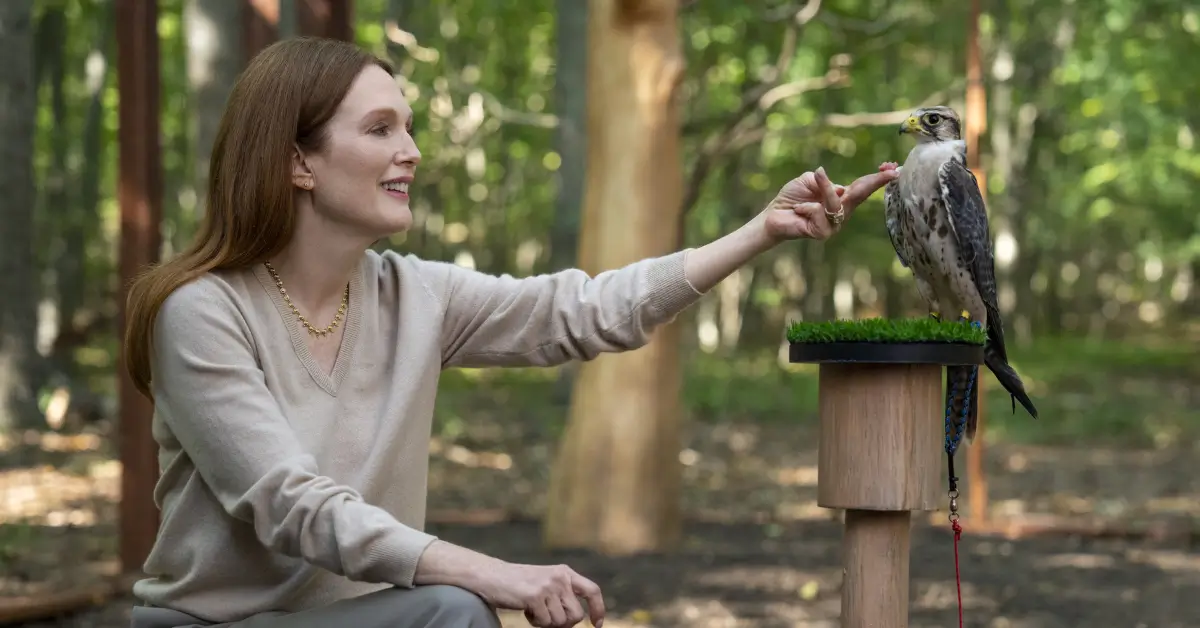Julianne Moore: Hollywood’s Chameleon of Emotional Depth
Introduction
Julianne Moore stands as one of Hollywood’s most versatile and accomplished performers, crafting a career defined by emotional intelligence, artistic integrity, and remarkable versatility. With her striking red hair, luminous screen presence, and ability to disappear completely into her characters, Moore has become a true acting powerhouse whose work consistently elevates the projects she takes on. From independent films to major studio productions, Moore’s commitment to authenticity and nuanced character work has earned her a special place in cinema history, with performances that linger in viewers’ minds long after the credits roll.
Few actors can match Moore’s talent for embodying complex, often troubled characters with such empathy and precision. Her five Academy Award nominations (with one win) only begin to illustrate her impact on the film industry. Through a career spanning more than three decades, Moore has consistently chosen roles that challenge both herself and audiences, becoming a symbol of artistic excellence and integrity in an industry often driven by commercial considerations.
Early Life & Career Beginnings
Born Julie Anne Smith on December 3, 1960, at Fort Bragg in North Carolina, Julianne Moore’s nomadic childhood as the daughter of a military judge father and a Scottish immigrant mother who worked as a psychologist and social worker shaped her worldview. The family moved frequently, living in multiple U.S. states and Germany. This constant relocation perhaps contributed to Moore’s remarkable ability to adapt and observe different types of people – skills that would later serve her acting career.
Moore discovered her passion for acting while attending Boston University, where she earned a Bachelor of Fine Arts in Theatre in 1983. Like many actors, she began her professional career in television, appearing on the soap opera “As the World Turns” from 1985 to 1988. This role earned her a Daytime Emmy Award and provided valuable on-camera experience.
Her early film appearances included supporting roles in films like “The Hand That Rocks the Cradle” (1992) and “The Fugitive” (1993). However, her breakthrough came with Robert Altman’s “Short Cuts” (1993), where her raw, emotionally exposed performance caught the attention of critics and filmmakers alike. Shortly after, her role in Louis Malle’s “Vanya on 42nd Street” (1994) further demonstrated her theatrical training and emotional depth, establishing her as a serious dramatic talent to watch.
Filmography & Career Highlights
Moore’s filmography is remarkable not only for its quality but also for its diversity. She has consistently alternated between independent art films and more mainstream fare, always bringing the same level of commitment regardless of budget or scope.
Her career reached new heights in the late 1990s with a string of acclaimed performances. In 1997, she appeared in Steven Spielberg’s “The Lost World: Jurassic Park,” demonstrating her ability to bring depth to blockbuster entertainment. That same year, her portrayal of a porn star and cocaine addict in Paul Thomas Anderson’s “Boogie Nights” earned her first Academy Award nomination and showcased her fearlessness as an actor.
The early 2000s saw Moore continue her ascent with unforgettable roles in films like:
- “The End of the Affair” (1999) – Her portrayal of Sarah Miles, a woman torn between duty and passion, earned her another Oscar nomination
- “Far From Heaven” (2002) – Her performance as a 1950s housewife discovering her husband’s homosexuality while developing feelings for her Black gardener demonstrated her ability to convey repressed emotion
- “The Hours” (2002) – As a housewife planning to leave her family, Moore contributed to this complex, interwoven narrative about women across different eras
- “Children of Men” (2006) – Her brief but powerful appearance in this dystopian masterpiece showed how Moore could make an impact even in limited screen time
Her versatility has allowed her to shine in psychological thrillers (“Hannibal”), comedy (“The Big Lebowski”), science fiction (“Children of Men”), family films (“The Hunger Games” series), and intense character studies (“Magnolia”). Perhaps most impressively, Moore finally won her long-overdue Academy Award for her heartbreaking portrayal of a linguistics professor diagnosed with early-onset Alzheimer’s disease in “Still Alice” (2014).
Acting Style & Techniques
What distinguishes Moore from many of her peers is her extraordinary ability to reveal the inner lives of her characters through subtle facial expressions and physical mannerisms. While not strictly a method actor, Moore is known for her meticulous research and preparation for roles. Her approach combines technical precision with emotional truth, creating performances that feel both carefully crafted and utterly spontaneous.
For “Still Alice,” Moore spent months meeting with Alzheimer’s patients and specialists to understand the disease’s progression and impact. For “The End of the Affair,” she perfected a British accent so convincing that many viewers were surprised to learn she was American. When preparing for “Boogie Nights,” she observed actual adult film performers to capture their particular blend of vulnerability and bravado.
Directors who have worked with Moore consistently praise her professionalism, preparation, and emotional availability. Todd Haynes, who directed her in both “Far From Heaven” and “Safe,” has spoken about her remarkable technical control combined with emotional openness. Paul Thomas Anderson has noted her willingness to explore uncomfortable emotional territory without self-consciousness.
Unlike some actors who rely on a signature acting style, Moore disappears so completely into her characters that viewers often forget they’re watching “Julianne Moore.” Her transformations aren’t typically physical (though she has altered her appearance when necessary) but rather emotional and psychological. She excels at portraying women in crisis or transition, often revealing the complex inner struggles beneath a composed exterior.
Challenges & Controversies
Despite her undeniable talent, Moore’s career has not been without challenges. She has spoken candidly about facing the same issues that confront many actresses in Hollywood, particularly regarding age and gender bias. In her 40s, when many actresses find roles becoming scarce, Moore continued to seek out and create opportunities for complex female characters.
Moore has been vocal about the industry’s tendency to sideline women over 40, telling The Guardian in a 2013 interview: “There are still so few decent roles for women over 40. It’s a relevant issue because people want to see stories about women at all ages.”
Rather than accepting the limitations typically imposed on actresses of her generation, Moore has actively sought out roles that challenge stereotypes about aging women. Films like “Gloria Bell” (2018) and “The Kids Are All Right” (2010) feature Moore as sexually active, complex women navigating midlife – characters rarely centered in mainstream American cinema.
While largely avoiding major public controversies, Moore has occasionally received criticism for taking on certain roles. Her portrayal of a lesbian in “The Kids Are All Right” sparked some debate about straight actors playing LGBTQ+ characters, though the film was largely praised for its nuanced depiction of a same-sex relationship.
Awards & Recognitions
Moore’s trophy case is impressive by any standard. After four previous nominations, she won the Academy Award for Best Actress for “Still Alice” in 2015. She has also received two Golden Globe Awards, two SAG Awards, two Emmy Awards (including one for her remarkable portrayal of Sarah Palin in the HBO film “Game Change”), and a BAFTA.
In 2015, she won the Best Actress award at the Cannes Film Festival for her role in David Cronenberg’s “Maps to the Stars,” making her one of the few performers to win top acting prizes at all three major film festivals (Cannes, Berlin, and Venice).
Beyond these specific honors, Moore has achieved something arguably more significant: critical respect that has endured across decades. Film critics regularly cite her as one of her generation’s finest actors, pointing to her remarkable consistency and range.
Cultural & Industry Impact
Moore’s influence extends beyond her own performances. She has been a pioneering force for complex female characters in an industry that often reduces women to stereotypes or supporting roles. Her willingness to take on challenging, unconventional roles has helped expand the possibilities for actresses of all ages.
Her advocacy for greater gender parity in Hollywood predates the recent #MeToo and Time’s Up movements. Moore has consistently spoken out about the need for more women directors, writers, and producers, as well as the importance of telling women’s stories on screen.
As a cultural figure, Moore has used her platform to advocate for several causes, including gun violence prevention through her involvement with Everytown for Gun Safety. Following the Sandy Hook Elementary School shooting in 2012, she became increasingly outspoken about the need for sensible gun control legislation.
Her willingness to portray flawed, complex women – often in unglamorous ways – has helped shift cultural perceptions about female representation on screen. Characters like her porn actress in “Boogie Nights,” her depressed housewife in “The Hours,” or her aging actress in “Maps to the Stars” challenge conventional notions of how women should be portrayed in film.
Personal Life & Philanthropy
Despite her fame, Moore has maintained a relatively private personal life. She has been married to director Bart Freundlich since 2003, after meeting on the set of “The Myth of Fingerprints” in 1996. The couple has two children, Caleb and Liv.
Moore has spoken about the importance of family in grounding her amid the sometimes unstable nature of an acting career. She has largely raised her family in New York rather than Los Angeles, preferring the relative normalcy of life away from the Hollywood spotlight.
Beyond her advocacy for gun safety, Moore supports organizations focused on children’s health and education. She has worked with the Children’s Health Fund, which provides healthcare to underserved children, and Save the Children, serving as an Artist Ambassador.
Moore is also an accomplished children’s book author, having written several books in the “Freckleface Strawberry” series, inspired by her own experiences growing up with red hair and freckles. These books promote self-acceptance and celebrate differences among children.
Future Projects & What’s Next
As of my knowledge cutoff in October 2024, Moore continues to take on challenging and diverse roles. She has demonstrated an interest in producing projects that align with her artistic sensibilities, giving her greater control over the types of stories she helps bring to the screen.
Moore has expressed interest in directing, though she approaches this potential career expansion with the same thoughtfulness that characterizes her acting choices. Her decades of experience working with many of cinema’s most accomplished directors have provided her with a masterclass in filmmaking.
Unlike many actors who become less selective as they age, Moore appears to have become even more discerning about her projects, focusing on quality over quantity. This approach suggests that, while we may see her in fewer films than in earlier decades, her work will continue to be meaningful and impactful.
Conclusion
Julianne Moore’s career represents a master class in artistic integrity. Through more than three decades in the spotlight, she has consistently chosen substance over spectacle, emotional truth over easy appeal. Her performances reveal the complexity of human experience – particularly women’s experiences – with remarkable sensitivity and precision.
What distinguishes Moore from many of her equally talented contemporaries is her unwavering commitment to authenticity. Whether portraying a woman battling Alzheimer’s, a 1950s housewife confronting societal constraints, or a porn star navigating a changing industry, Moore brings dignity and humanity to every character she embodies.
In an industry often criticized for its superficiality, Moore has built a career on depth – emotional depth, intellectual depth, and artistic depth. Her legacy will be that of an actor who elevated every project she joined through her remarkable ability to reveal the inner lives of complex women with honesty, empathy, and technical brilliance.
What is your favorite Julianne Moore performance, and what made it particularly impactful for you?

